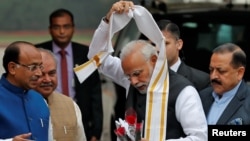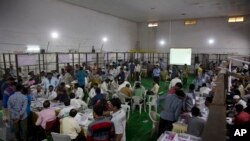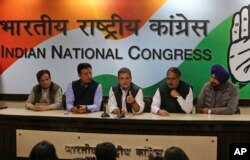India's ruling Bharatiya Janata Party conceded defeat in two stronghold states while it remains locked in a tight race in a third, according to official counts from state elections that began in mid-November. This would be Prime Minister Narendra Modi's biggest loss since taking office four years ago and precedes general elections set for 2019.
The BJP was trailing its main rival, the opposition Congress Party, in the western Rajasthan state, as well as the central state of Chhattisgarh. In another big central state, Madhya Pradesh, the two parties were neck and neck. The results have set the stage for a tougher battle for the Indian leader.
Known as Hindi heartland states, these BJP bastions had helped catapult the party to power in 2014 by handing it almost all the parliamentary seats.
Analysts said that although Modi remains a formidable political force, the regional polls signify a loss of momentum for the Indian leader, who led his party to a string of victories in regional polls since he swept to power more than four years ago.
The incoming results are a huge boost for the Congress Party after suffering a string of losses since Modi routed the party and rose to power.
The results Tuesday come amid growing disenchantment with what critics say is the government’s failure to deliver on promises of jobs for young people and development – key issues that had created a massive wave in his favor. Anger in the countryside has also grown with millions of farmers saying they have been pushed into debt as they are not getting an adequate price for their produce. The BJP also faced anti-incumbency – it has been in power in Madhya Pradesh and Chattisgarh for three terms.
“The economic issues came to the fore much more and that is something that the prime minister and BJP will have to take into account in the coming weeks as they devise their strategy for 2019,” says independent political analyst Neerja Chowdhury.
As elated Congress Party leaders flashed victory signs, its leaders said the results were a clear indication that people were moving away from the BJP. "People have realized that the future is not the BJP and these three elections, these results will certify that sentiment that people have," said Sachin Pilot, a senior party leader.
The strong showing by the Congress Party also will provide a boost to efforts by its leader, Rahul Gandhi, to bring together a raft of smaller parties in a broad alliance to fight the BJP in the 2019 elections.
After a meeting of 21 parties in New Delhi on Monday to discuss the possibility of a united front, Gandhi said, "The goal of everybody is to defeat the BJP and protect India’s Constitution and our institutions." If an alliance is formed, it would mean that Modi will face a tougher battle in national elections.
Analysts point out that the BJP retains a significant presence in the heartland states from where it draws its main strength.
“The victory margins are very, very close,” says Satish Misra at the Observer Research Foundation. “That signifies that people are divided and the Lok Sabha battle would be an open and equal battle.” The Lok Sabha is the lower house of India's bicameral parliament.
Polls were also held in two small states — the small northeastern state of Mizoram and the southern state of Telangana. Regional parties — the Telangana Rashtra Samithi (TRS) in Telangana and the Mizo National Front in Mizoram — were set to emerge victorious in these states.
About 200 million people voted in the five states that went to the polls. These were the last round of state polls before the general elections in 2019.






